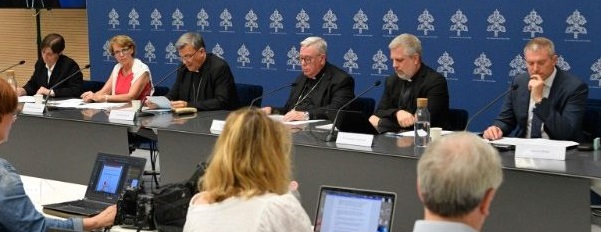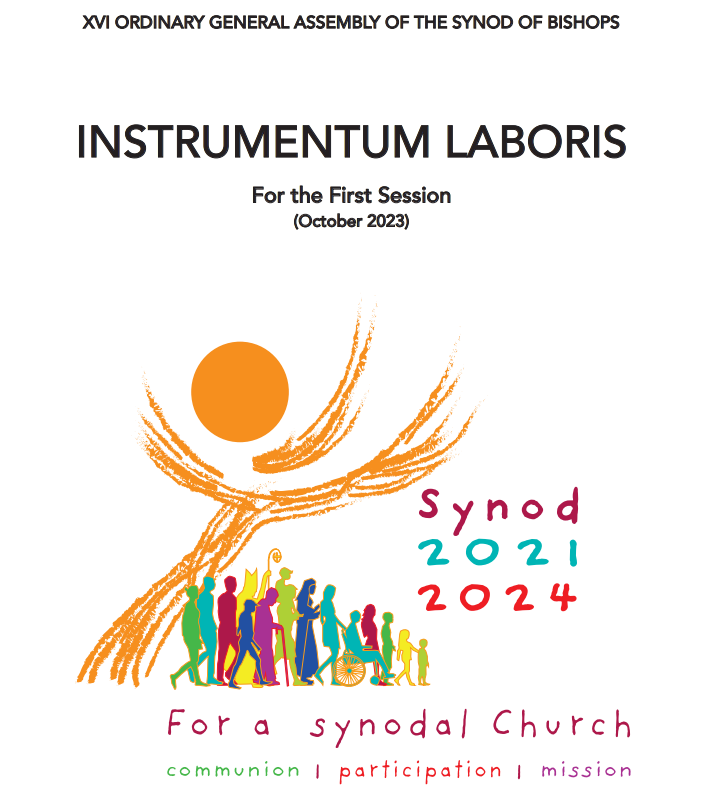This time last year, we in Hallam had begun the process of gathering for synodal meetings, to reflect together on the questions asked by Pope Francis in October 2021 We met in person, we responded to surveys, we filled in postcards and sent them to Bishop Ralph or directly to Rome. We collected all the responses and wrote a Hallam diocesan response, which was incorporated with the responses from all the other dioceses in England and Wales, into the document sent by the Bishop’s Conference to Rome. This was synthesised with submissions from 112 Bishop’s Conferences, into the Document of the Continental Stage, produced in October 2022 by the Vatican Synod office, and entitled “Enlarge the Space of your Tent” and which was followed between January and March 2023, by a series of Continental Synodal Assemblies.
On Tuesday 20 June, the fruits of these assemblies was published as the Instrumentum Laboris, the working document outlining the focus and method for the Synod on Synodality meeting in Rome in October 2023 and October 2024. More on this next month.

For us in Hallam, having been involved in the opening processes of the Synod, it was time to take stock, and reflect on our journey through the year, in the diocese, in the parish and personally. Pope Francis is inviting us to be a synodal church, which doesn’t mean one-off events but a method of journeying together as the People of God which conveys communion, participation and mission, through listening and discernment, listening for the voice of the Holy Spirit heard especially in the voices of the marginalised.
So on Saturday 17th June, there was a meeting at the Pastoral Centre to look back over our synodal efforts of the past year and consider some ways for the diocese to journey onwards.
Some of the reflections and suggestions that emerged from the meeting were about relationships between priest and laity. There were suggestions about how to plan for and improve these relationships particularly where there are differences in understanding about the nature of the priesthood and authority in the church. The popularity of the synodal method of encounter and listening was clear particularly in the eagerness to use the method ongoing in parish meetings and particularly where there is disagreement and conflict.
- Parishes worked hard to produce their own synod feedback and documents and these should not be lost. The parish reports give valuable information about the concerns of the people of the parish and should be the basis of action in the parish.
- All parishes should have a Synodal Group that prays together for the parish for the guidance of the Holy Spirit in discernment on parish matters.
- That parish meetings should adopt the synodal listening model and be open to all.
- Consider a Team Ministry model of priest and laity working collaboratively together.
- Slow things down to take time for listening.
- A programme of induction for new priests coming into a parish and into the diocese, to help them to be sensitive to the culture they will encounter in different places.
- A ‘job description’, scrutiny and accountability for priests so there is some expectation that any and all parishes are engaging to build the synodal church.
- Providing support for priests to help them to understand and be ‘servant leaders’ of the parish, working collaboratively with the laity and with the Holy Spirit.
- Decision-making within the parish, including finance, ministry and parish life, needs to be opened up to the laity with establishment of Pastoral Parish Councils being a requirement for all parishes.
- The diocese needs to operate a model of transparency and accountability, consulting with the laity e.g. before any decisions about placing of priests occurs, communicating the structure and activities of the diocesan curia, and holding annual public meetings to give a report on the activities of the year and the plans for the year ahead.
- Support for young families and children to feel that they belong and have more opportunities to learn about their faith.
- Parishes without priests are very likely in the future, and preparation for this needs to be underway now.
- Liturgy – is it participatory and active?
- Opportunities for Ecumenical dialogue encouraged.
- Parishes to pay attention to how welcoming they are and what is the experience of the stranger who comes to the door of the church. Do people feel welcomed and accepted?
- Find ways to include people who haven’t yet joined the journey.
- Don’t be afraid, but welcome differences and be aware that you might be the one who needs to change.
There was much encouragement, joy and excitement about the feeling of the Church being ‘on the move’, slowly but inexorably, and a wish to bring more people into the discussions and actions for the future. If you would like to contribute other ideas please get in touch with the Synod Co-ordinators. As Bishop Ralph pointed out, this is all God’s work.
More on the synodal journey in next month’s Hallam Bridge.



